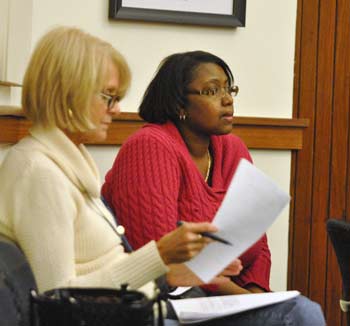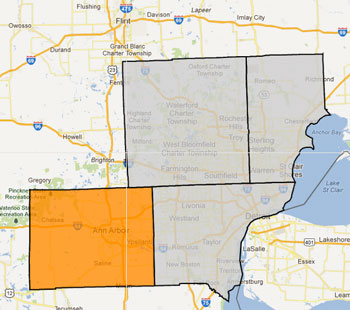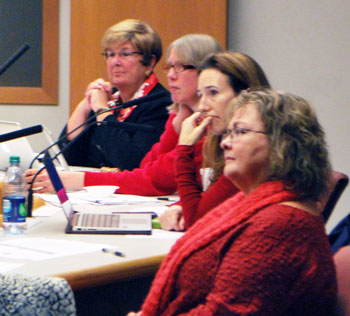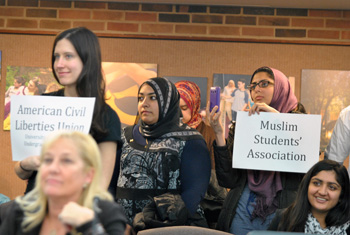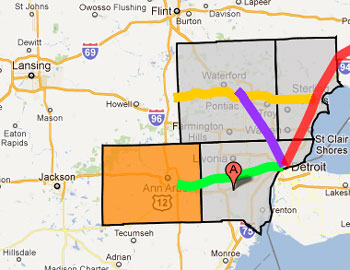County Considers Road Funding Options
Washtenaw County board of commissioners working session (April 17, 2014): For more than two hours, county commissioners discussed the future of the road commission and appeared to reach consensus that no major structural changes will be made at this time.
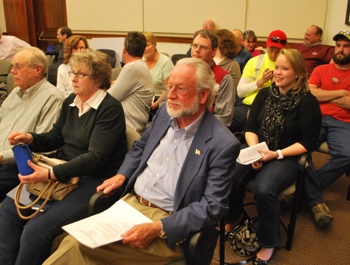
Several Washtenaw County road commission employees attended the county board’s April 17 working session, as did some township officials. In the foreground is Manchester Township supervisor Gene DeRossett. (Photos by the writer.)
More likely, though not yet determined, are efforts to find additional funding sources for road maintenance – including a possible countywide road millage on the Nov. 5, 2014 ballot.
Keeping the road commission unchanged had been the recommendation of a board subcommittee that met for several months to discuss available options, including the possibility of dissolving the road commission and making it part of county operations, rather than operate as an independent entity. Most county commissioners oppose that approach. The board’s May 7 agenda includes a resolution accepting the subcommittee recommendations, which also rejects making the job of road commissioner an elected position. The three road commissioners are currently appointed by the county board.
State legislation enacted in 2012 allowed for: (1) a county board of commissioners to exercise the powers and duties of a road commission; and (2) the functions of a road commission to be transferred to the county board. A sunset clause means that the laws expire on Jan. 1, 2015. That deadline prompted the county board to examine these options.
The board’s May 7 agenda includes a letter to the state House Transportation & Infrastructure Committee, urging passage of HB 5117 and 5118 – bills that would eliminate the current sunset clause and extend the options for changing the road commission functions.
Much of the focus of the April 17 working session was on funding options and long-term strategy for maintaining the county’s road network. Several township representatives who attended the session voiced support for special assessment districts, known as SADs, which are being used in Scio Township to pay for road maintenance.
But Conan Smith, an Ann Arbor Democrat who’s been vocal in urging the county board to take responsibility for the road commission, argued that SADs shouldn’t be a long-term approach. The road network is an asset to the entire county’s economy, he said, and the burden of maintaining it shouldn’t rest on the smaller communities.
Smith also noted that the economy is changing. Telecommuting, for example, might change the way people use the roads, he said. Later in the meeting, road commissioner Barb Fuller noted that other infrastructure needs are important to achieve the vision that Smith had described. “I would suggest that you folks look at making broadband ubiquitous across the county,” she said. For those commissioners who take access to broadband as a given, she said, “trust me – there are parts of the county where they can’t get a signal at all.”
Yousef Rabhi, another Ann Arbor commissioner, also spoke of the need for a broader vision. Roads should serve not just drivers, but also bicyclists and pedestrians. Potholes are a serious safety issue for cyclists, he noted. “We have to keep in mind that not every taxpayer drives a car.”
Regarding funding for roads, Rabhi wanted the discussion to be about the structure of a millage – not whether there should be a new road tax. “I think it’s pretty obvious that we need more money,” he said.
The May 7 agenda includes a discussion item on options for road funding. A draft resolution was circulated at the April 17 working session to put a countywide road millage on the Nov. 5, 2014 ballot. The draft resolution calls for a four-year, 0.5 mill tax – from 2014-2017 – that would raise $7.15 million in its first year. It would earmark 50% of the gross revenues to be used in the municipality in which the revenue was generated. Beyond that, 10% would be used for non-motorized transportation needs – like bike lanes and pedestrian paths – with the remainder to be allocated “based on use, need, and impact to the traveling public.”
Another possibility is for the county board to levy a millage under Act 283. The law allows the county board to levy a millage to cover those costs, without voter approval. A draft resolution that’s been circulated among commissioners calls for levying a 1 mill tax in December 2014, which would generate $14.34 million “to repair 2013–14 winter damage to the roads, streets and paths in Washtenaw County.”
On April 17, commissioners also discussed the possibility of expanding the road commission board from three to five members. That discussion will be continued at a May 8 working session agenda.
For additional background on this process, see Chronicle coverage: “No Major Change Likely for Road Commission” and “Group Explores Road Commission’s Future.“ [Full Story]




